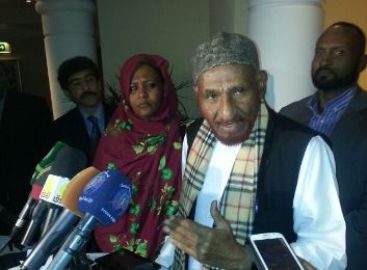Al-Mahdi says Sudanese government returned only 6% of his party’s confiscated assets
December 26, 2014 (KHARTOUM) – The leader of Sudan’s opposition National Umma Party (NUP), al-Sadiq al-Mahdi, claimed that the government repaid only 6% of his party’s confiscated assets.

Al-Mahdi, in a speech on the occasion of his 79th birthday on Thursday, said his party’s economic committee last March estimated the regime owes them 48 billion pounds SDG ($6 million ), noting that some of the confiscated assets were returned in the year 2000.
He explained that the government only paid them 3 billion SDG at installments, saying that they sought to distort their image and portray it as financial assistance to the NUP.
The opposition leader said that “Sudan’s womb is carrying the fetus of the new regime” which has grown this year.
He recalled the report presented by the prosecutor of the International Criminal Court (ICC), Fatou Bensouda, before the United Nations Security Council (UNSC) earlier this month, saying it would entail political or police measures against the Sudanese government.
The NUP leader said he asked the UNSC to seek a solution which achieves either punitive justice or preventive justice, pointing that failure of the UNSC to act upon the prosecutor’s request would mean failure to achieve justice and abandonment of international responsibility.
The ICC prosecutor Fatou Bensouda told the UNSC this month that she will freeze her office’s Darfur investigations due to lack of UNSC follow-up and stretched resources.
Following the report, Bashir hailed Bensouda’s decision as a victory for his country and a sign of surrender by the ICC.
“The charges of the court were an attempt to subjugate and humiliate, but it has now lifted up its hands and surrendered,” Bashir said last week.
But later the Sudanese foreign minister said that Bensouda’s report is an attempt to escalate the crisis in Darfur.
Al-Mahdi further said the regime is adopting confrontational policies, underscoring that his party seeks to unite the Sudanese people behind demands for a new regime that accomplishes peace and democracy.
“We say to all our brave people including those who are part of the regime that the regime is shutting itself up of its people and the world and you will be held responsible for its abuses so you should rescue yourselves and align to the peoples’ demands”, he said.
The veteran politician defended the “Paris Declaration” saying it achieved seven objectives including a new balance of power, abandoning toppling of the regime by force, unity of the country, welcoming the role of Egypt and the Arab League in resolving Sudan’s issues, uniting forces of change and achieving balance between the center and the peripheries.
He saw the Paris Declaration as the legitimate father of the agreement on national dialogue and constitutional process signed under the auspices of the African Union besides the Sudan Call deal signed in Addis Ababa earlier this month.
“These [various agreements] are beads in the rosary of the country which gathered several political and civil forces and it will include all political, civil, armed, academic, tribal and Sufi orders forces”, he added.
On 8 August, the NUP and the rebel umbrella Sudan Revolutionary Forces (SRF) signed the Paris Declaration, which calls for ending the wars and engaging in a genuine national dialogue aimed at restoring democracy in Sudan.
On 5 September, the Paris Declaration forces signed a framework agreement with the national dialogue committee known as 7+7 on the national dialogue and constitutional process.
Al-Mahdi further criticized the government’s reaction to the Sudan Call agreement, condemning arrest of two of its signatories.
On December 3rd, Sudanese political and armed opposition forces and civil society organizations signed the “Sudan Call” accord in Addis Ababa calling for ending the war, dismantlement of the one-party state, achievement of a comprehensive peace and democratic transition in the country.
The agreement was signed by the head of the opposition alliance National Consensus Forces (NCF), Farouk Abu Issa, deputy chairman of the SRF Minni Minnawi, al-Mahdi and head of the Alliance of the Sudanese Civil Society Organizations, Amin Maki Madani.
Earlier this month, NISS arrested Abu Issa and Madani, besides former ruling National Congress Party (NCP) member, Farah Agar, and his office manager, Mohamed Eldoud after their return from Addis Ababa where they signed the “Sudan Call” with rebel groups.
The Sudanese president Omer Hassan al-Bashir accused signatories of the “Sudan Call” of being agents to foreign powers and warned them from returning to the country.
He described the opposition parties allied with the SRF as “mercenaries”.
(ST)
